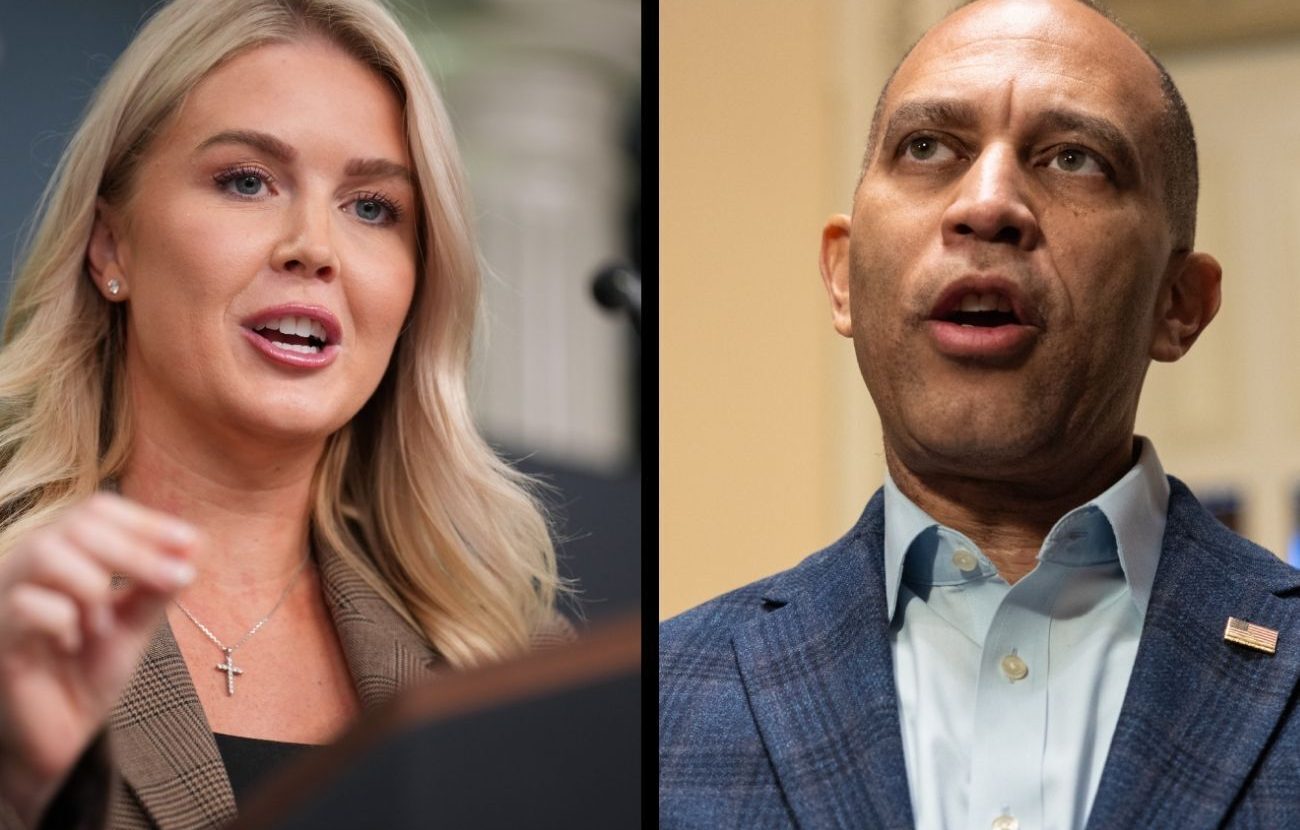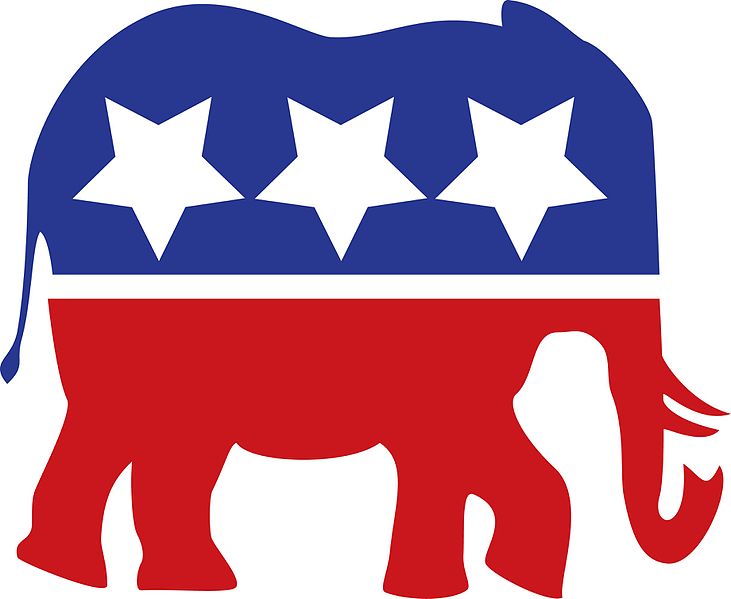WASHINGTON, D.C. — The rhetoric in Washington reached a fever pitch Friday as House Minority Leader Hakeem Jeffries (D-N.Y.) launched a blistering personal attack on White House Press Secretary Karoline Leavitt, accusing her of spreading “hate and lies” during the ongoing government shutdown.
Speaking to reporters outside the Capitol, Jeffries appeared visibly frustrated as negotiations over the government funding stalemate entered their fourth week. His comments, first reported by Fox News, quickly drew national attention for their harsh tone.
“You’ve got Karoline Leavitt, who’s sick. She’s out of control,” Jeffries said. “And I’m not sure whether she’s just demented, ignorant, a stone-cold liar, or all of the above.”
The remarks came after Leavitt claimed earlier in the day that the Democratic Party “consists of terrorists, violent criminals, and undocumented immigrants,” a statement that sparked outrage among congressional Democrats and liberal commentators alike.
Jeffries condemned the comment as “a disgusting smear” and accused the Trump administration of using divisive rhetoric to distract from the hardships caused by the shutdown.
“The notion that an official White House spokesperson would say the Democratic Party consists of terrorists, violent criminals, and undocumented immigrants makes no sense,” Jeffries said. “This is what the American people are getting from the Trump administration in the middle of a shutdown.”
https://twitter.com/EricLDaugh/status/1979195618338746719
Leavitt Fires Back
Leavitt wasted no time responding, issuing a fiery rebuttal on X (formerly Twitter) in which she accused Jeffries of “lashing out because he knows what I said is true.”
“Hakeem Jeffries and the Democrats are lashing out because they know what I said is true,” Leavitt wrote. “The Democrat Party’s elected officials absolutely cater to pro-Hamas terrorists, illegal aliens, and violent criminals.”
She went on to defend her earlier remarks, pointing to several Democratic votes and policy stances she said “prove her point.”
“House Democrats voted against a resolution condemning Hamas following the horrific October 7th terrorist attacks,” she said. “Democrats cheered on pro-Hamas radicals while they hijacked America’s college campuses and harassed Jewish students.”
Leavitt also tied the Democratic leadership to what she described as “soft-on-crime” and “open-border” policies that have, in her view, endangered American communities.
“Democrats opened our borders and allowed tens of millions of illegal aliens into our country over the past four years, including rapists and murderers, because they view them as future voters,” she said. “Democrats coddle violent criminals and support cashless bail policies that let offenders back on the streets to hurt law-abiding citizens.”
Her post concluded with a personal swipe at Jeffries himself:
“Democrats do NOT serve the interests of the American people. Hakeem Jeffries is an America Last, stone-cold loser. Now open up the government and stop simping to try to get your radical left-wing base to like you.”
https://twitter.com/PressSec/status/1979360773618176054
Escalating Political Crossfire
Leavitt’s comments mark the latest in a string of increasingly personal clashes between Trump administration officials and Democratic leadership as the government shutdown enters its fourth week.
Negotiations over a temporary funding bill have stalled amid deep divisions between the two parties. Republicans have called for a “clean continuing resolution” to reopen the government through November 21, while Democrats insist on including additional healthcare subsidies and pandemic-era spending extensions.
The deadlock has left hundreds of thousands of federal workers unpaid and critical welfare programs like SNAP on the verge of running out of funds — raising the stakes for both parties.
Political analysts say the Jeffries–Leavitt feud underscores how the shutdown has shifted from a budgetary dispute to a broader political and cultural battle.
“This fight has gone beyond numbers — it’s now about who can control the national narrative,” said political analyst Dr. Michael Vance. “Leavitt’s rhetoric appeals to the populist right, while Jeffries is trying to frame the GOP as reckless and hateful. Both are playing to their bases.”
A Tangled Capitol Controversy
Jeffries’ outburst came amid questions about a separate controversy on Capitol Hill involving Rep. Dave Taylor (R-Ohio), after reports emerged that a swastika symbol was found on an American flag displayed inside his office.
When asked to respond, Jeffries pivoted to criticize what he called “the dangerous normalization of extremism in GOP ranks.”
Taylor, however, said his office was the victim of a coordinated campaign, claiming that multiple Republican offices had received similar flags that appeared normal at first glance but later revealed the symbol when unfolded.
“The flag was taken down immediately upon the discovery of the obscured symbol it bore,” Taylor said. “No employee of this office would knowingly display such a despicable image.”
While Jeffries did not directly accuse Taylor of wrongdoing, his linking of the incident to broader GOP behavior fueled further partisan tension during the press conference.
Shutdown Politics: The Broader Picture
The Jeffries–Leavitt confrontation adds another flashpoint to a Capitol already boiling with partisan recriminations.
Senate Democrats have now voted 14 times against the House-passed stopgap funding bill, which would temporarily fund the government at current levels while longer-term negotiations continue.
Republicans accuse Democrats of holding up the process to push unrelated policy riders, such as expanded healthcare subsidies and climate spending provisions, while Democrats claim the GOP is refusing to negotiate in good faith on healthcare and social safety net issues.
Meanwhile, President Donald Trump has kept the pressure on Democrats, urging them to “stop the political games” and vote to reopen the government.
“All they have to do is say yes — and it’s over,” Trump said Thursday. “But instead, they’d rather keep families suffering just to protect their political leverage.”
Public Reaction and Political Fallout
Reaction to the exchange between Jeffries and Leavitt has been predictably divided.
Democrats condemned Leavitt’s rhetoric as “dangerous” and “unfit for public service,” while conservatives praised her for speaking “plainly” about what they see as the Democratic Party’s hypocrisy on national security and border policy.
“Leavitt is doing what every press secretary should do — fight back,” said GOP strategist Matt Schlapp. “Jeffries made it personal because he knows Democrats are losing the narrative on this shutdown.”
On social media, hashtags like #JeffriesMeltdown and #KarolineLeavitt trended across X by Friday afternoon, with both sides framing the clash as emblematic of broader political dysfunction.
The Bottom Line
As the government shutdown stretches into another weekend, tempers are flaring and the rhetoric is growing more personal.
For many Americans watching from the outside, the increasingly caustic exchanges — like the one between Hakeem Jeffries and Karoline Leavitt — illustrate just how deeply divided Washington has become.
Whether either side can step back from the brink to reach a compromise remains uncertain. For now, both parties seem more focused on winning the blame game than reopening the government.
As one veteran Hill staffer put it: “It’s not about policy anymore — it’s about pride.”

Emily Johnson is a critically acclaimed essayist and novelist known for her thought-provoking works centered on feminism, women’s rights, and modern relationships. Born and raised in Portland, Oregon, Emily grew up with a deep love of books, often spending her afternoons at her local library. She went on to study literature and gender studies at UCLA, where she became deeply involved in activism and began publishing essays in campus journals. Her debut essay collection, Voices Unbound, struck a chord with readers nationwide for its fearless exploration of gender dynamics, identity, and the challenges faced by women in contemporary society. Emily later transitioned into fiction, writing novels that balance compelling storytelling with social commentary. Her protagonists are often strong, multidimensional women navigating love, ambition, and the struggles of everyday life, making her a favorite among readers who crave authentic, relatable narratives. Critics praise her ability to merge personal intimacy with universal themes. Off the page, Emily is an advocate for women in publishing, leading workshops that encourage young female writers to embrace their voices. She lives in Seattle with her partner and two rescue cats, where she continues to write, teach, and inspire a new generation of storytellers.









